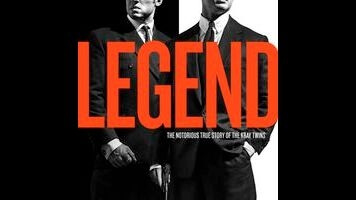It’s tempting to give Hardy all the credit for this illusion—mainly because Legend is otherwise such a letdown. But writer-director Brian Helgeland undoubtedly had a lot to do with shaping the performance, as did his costumers, his makeup crew, and all the art directors and digital effects technicians who recreated a glamorous past for Hardy’s Kray boys to stomp through. At its best, Legend is a handsome evocation of the era when British Invasion rockers and pretty young movie stars hung out at hot nightclubs owned by terrible people. Just as Helgeland and Hardy distinguish Ronnie from Reggie, the director and his team bring to life the two Swinging Londons: the one with all the mod fashions and libertine decadence, and the one where violent crooks held perverse tribunals in crumbling buildings, deciding who lived and died.
The problem is that this well-constructed setting and these magnificently modulated performances are missing a story that lives up to the movie’s title. Helgeland’s following multiple threads simultaneously, but fails to weave them into any kind of satisfying or illuminating whole. Legend is partly about how Reggie seduced his wife Frances (played by Emily Browning), who also serves as the film’s narrator, describing from the inside how the Krays’ bad boy luster dulled after endless days of bickering and broken promises. It’s also about how the brothers crushed their competition and drew interest from American syndicates, who offered to expand their business globally and make them more legit. The themes here are all well worn, primarily exploring how an ambitious gangster’s plans for a better life keep getting undone by the volatility of his business associates.
If all that sounds a little like Goodfellas, Casino, Mean Streets… well, it’s hard to deny the Martin Scorsese influence on Legend. From Frances’ voice-over to the long scene of Reggie showing off for his best gal by taking her through one of his clubs, the movie at times crosses the line from homage to rip off. That said, Helgeland (best-known for his L.A. Confidential and Mystic River screenplays and for writing and directing Payback and 42) does have some chops. And he’s ably supported by an elegiac Carter Burwell score, softly luminescent Dick Pope cinematography, and an all-star cast of character actors who pop up occasionally to bring some fresh energy. Legend becomes more and more of a slog the longer it goes on—and it goes on for a while—but its individual scenes are often well-crafted and exciting, doing a more than credible imitation of classic crime pictures.
It’s hard to imagine though how any of this would go over without Hardy, who convincingly embodies both sides of Legend’s dialectic. As Reggie, he’s a suave operator with impeccable manners, who understands the importance of public relations but still isn’t opposed to settling disputes with his fists—or by turning loose his hammer-wielding psychotic brother. And as Ronnie, he’s a surprisingly eloquent thug who makes the case that people shouldn’t hate who they are—and then lives his principles by being openly gay and openly criminal. When the two Krays are in the same room, circling each other with a mix of fraternal affection and deep loathing, Legend is as heady and unforgettable as it means to be. The rest of the time, it’s a movie with a lot of good points, but no connecting line.










![Rob Reiner's son booked for murder amid homicide investigation [Updated]](https://img.pastemagazine.com/wp-content/avuploads/2025/12/15131025/MixCollage-15-Dec-2025-01-10-PM-9121.jpg)

























![HBO teases new Euphoria, Larry David, and much more in 2026 sizzle reel [Updated]](https://img.pastemagazine.com/wp-content/avuploads/2025/12/12100344/MixCollage-12-Dec-2025-09-56-AM-9137.jpg)




